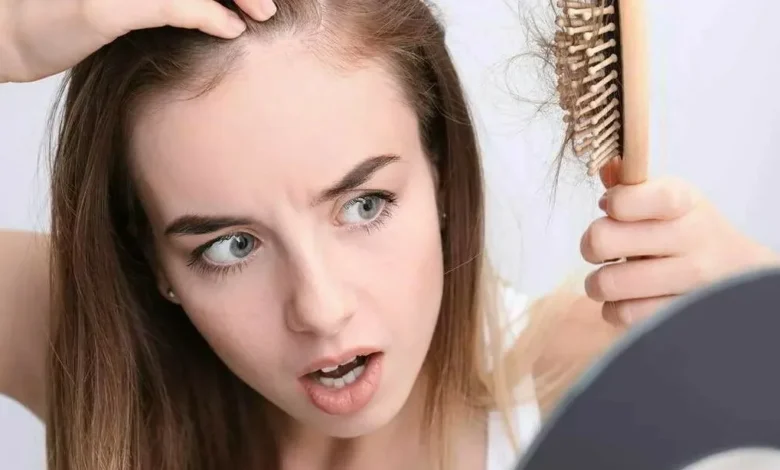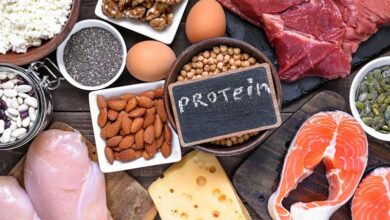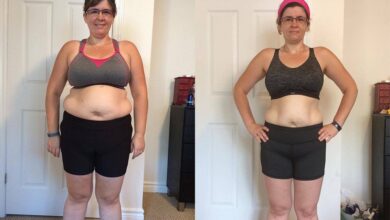
Losing weight is an exciting journey, but sometimes it comes with an unwanted side effect: hair loss. If you’ve noticed more strands on your brush or thinning patches while shedding pounds, you’re not alone. Many people in Africa, the United States, Europe, and across the globe face this exact problem. The good news? Hair loss during weight loss is preventable with the right strategies.
This article will walk you through everything you need to know—from nutrition to lifestyle choices—so you can slim down without compromising your hair’s shine and strength. Think of it as your all-in-one guide to balancing fitness and fabulous locks.
Read Also 8 Quick Weight Loss Strategies for Busy Lifestyles
Understanding the Link Between Weight Loss and Hair Loss
When we talk about weight loss, most people focus on calories, workouts, and the scale. But here’s the thing—your body is a system, and every drastic change has ripple effects. Hair follicles are super sensitive. They need constant nourishment from vitamins, proteins, and minerals.
When you cut calories too aggressively or skip nutrient-dense foods, your body goes into “survival mode.” It prioritizes vital organs like the heart and brain, putting hair growth on the back burner. That’s when telogen effluvium, a temporary hair shedding condition, often kicks in.
Other contributing factors include hormonal shifts, stress, dehydration, and lack of protein. If you’re seeing hair fall after starting a new diet, chances are your body is trying to adapt. But the great news? You can take back control with mindful adjustments.
Why Protein Is the Hair-Saving Macronutrient
Think of protein as the building block of your hair. Each strand is made of keratin, a protein that thrives only when your diet supports it. Skimping on protein may speed up weight loss, but it leaves hair weak, brittle, and prone to shedding.
Nutritionists recommend consuming 1.2 to 1.6 grams of protein per kilogram of body weight daily when losing weight. This isn’t just good for your hair—it also preserves muscle mass, keeps you fuller, and supports metabolism.
Some high-protein, hair-friendly options include:
- Lean chicken and turkey
- Fish (salmon, tuna, sardines)
- Eggs
- Greek yogurt
- Lentils, beans, and chickpeas
- Quinoa
Here’s the bottom line: if your plate looks like all salad and no protein, your hair will pay the price.
Essential Vitamins and Minerals for Hair Growth
To grow thick, healthy hair while losing weight, you need a balanced intake of micronutrients. These act like fuel for your follicles.
- Biotin (Vitamin B7): Crucial for keratin production. Found in eggs, almonds, and sweet potatoes.
- Vitamin D: Deficiency can trigger hair loss. Spend time in sunlight or add fortified foods.
- Iron: Low iron = weak hair. Include spinach, red meat, and lentils.
- Zinc: Repairs tissue and keeps oil glands active. Found in pumpkin seeds and shellfish.
- Vitamin C: Enhances iron absorption and supports collagen. Load up on citrus fruits and bell peppers.
- Omega-3 fatty acids: Reduce inflammation and nourish follicles. Found in fish, flaxseeds, and walnuts.
Instead of popping random supplements, talk to your doctor about testing deficiencies. Correcting them could be the fastest way to reclaim your hair.
Crash Diets: The Enemy of Healthy Hair
It’s tempting to go on extreme low-calorie diets for quick results, but here’s the truth—they’re a nightmare for your hair. Crash diets often lack protein, vitamins, and minerals. They shock your system and lead to rapid shedding within a few weeks.
Ask yourself: would you rather lose weight fast but deal with thinning hair, or achieve steady results while keeping your locks strong? Slow, sustainable weight loss (1–2 pounds per week) is not only healthier but also hair-friendly.
Avoid fad diets that cut out entire food groups. Instead, embrace balanced eating with a focus on whole foods. Remember, your goal isn’t just to lose weight—it’s to transform your body while maintaining confidence, and your hair is part of that confidence.
Hydration: Why Water Is Your Hair’s Best Friend
Water does more than quench your thirst—it supports blood circulation, nutrient delivery, and scalp health. Dehydration can make your hair dry, brittle, and more prone to breakage.
A simple rule is to drink 8–10 glasses daily, but if you exercise intensely or live in hot climates like Africa, you may need more. Herbal teas, infused water, and hydrating fruits like watermelon also count.
Think of hydration as the invisible conditioner working from the inside out. If your weight loss plan doesn’t prioritize water, your hair will show it.
The Role of Hormones in Hair Loss During Weight Loss
Hormones are the silent directors behind many changes in your body. When you shed pounds, your thyroid and estrogen/testosterone levels can shift. This often triggers temporary hair loss.
For women, sudden calorie restriction can disrupt the menstrual cycle, lowering estrogen and leading to thinning hair. For men, rapid fat loss sometimes affects testosterone balance, impacting follicle health.
The key? Choose gradual weight loss and avoid hormonal chaos. If you suspect an imbalance, consult an endocrinologist. Getting your hormones in check can stop shedding before it spirals.
Stress Management for Healthy Hair
Here’s a truth most people ignore: stress kills hair. Weight loss journeys often come with pressure, strict routines, and even guilt from “cheat meals.” This mental load spikes cortisol, which directly disrupts your hair growth cycle.
Incorporating stress-reducing habits can protect your strands:
- Yoga or meditation for 15 minutes daily
- Deep breathing exercises
- Journaling to release emotions
- Listening to calming music
- Prioritizing 7–8 hours of sleep
Managing stress isn’t just good for your mind—it’s hair insurance.
Best Hair Care Practices During Weight Loss
External care matters too. Your hair may already be fragile during weight loss, so treat it like silk. Avoid over-styling, harsh chemicals, and tight hairstyles that tug at the roots.
Stick to:
- Sulfate-free shampoos
- Nourishing oils like argan or coconut
- Wide-tooth combs to prevent breakage
- Regular trims to maintain shape
Sometimes the simplest care routine works wonders, especially when combined with a nutrient-rich diet.
Exercise and Hair Health: Striking the Right Balance
Exercise is essential for weight loss, but overdoing it can stress the body. Intense workouts without proper recovery increase cortisol and nutrient depletion, leading to hair loss.
The fix? Balance cardio with strength training and don’t forget rest days. Post-workout meals should include protein and complex carbs to refuel both muscles and hair follicles.
Think of exercise as a tool for both fitness and beauty—as long as you play smart.
Meal Plans That Support Hair and Weight Loss
Creating the right meal plan makes all the difference. Here’s a sample:
Breakfast: Greek yogurt with chia seeds and berries
Lunch: Grilled chicken, quinoa, and spinach salad
Snack: Boiled eggs or hummus with carrot sticks
Dinner: Salmon with roasted sweet potatoes and broccoli
This balance ensures you’re cutting calories without starving your hair.
When Supplements Are Necessary
Sometimes food alone isn’t enough. Supplements can fill nutritional gaps, especially during calorie restriction. Look for:
- Multivitamins with biotin and zinc
- Fish oil or omega-3 capsules
- Vitamin D tablets
- Iron (if prescribed)
Never self-medicate—get blood work done before starting supplements. Too much of a nutrient can harm you just as much as too little.
Cultural Hair Loss Myths Across Africa, the US, and Europe
Different regions have their own beliefs about hair loss. In some African cultures, braiding is blamed; in the US, people often assume stress alone is the cause; in Europe, fad diets take the spotlight. The truth lies in biology, not myths.
Understanding the real science behind hair loss empowers you to take the right steps, no matter where you live.
Signs You’re at Risk of Hair Loss During Weight Loss
Early detection helps you prevent serious thinning. Look out for:
- Excessive shedding in the shower
- Visible scalp patches
- Brittle, dry strands
- Slower regrowth
If these signs appear, pause and reassess your weight loss strategy.
When to See a Doctor
Not all hair loss is diet-related. Sometimes it signals underlying issues like thyroid disease, anemia, or autoimmune conditions. If your hair loss continues beyond 6 months, seek medical advice. Early treatment can restore growth and peace of mind.
Conclusion
Hair loss doesn’t have to be part of your weight loss journey. With balanced nutrition, hydration, stress management, and gentle care, you can achieve your dream body while keeping your hair strong and vibrant. Remember—your health is more important than any number on the scale, and healthy hair is part of that holistic picture.
Read Also Effective Weight Loss Tips for Busy Professionals
FAQs
1. Can hair loss from dieting be reversed?
Yes, most weight loss-related hair loss is temporary and reversible once nutrition and balance are restored.
2. How long does hair loss last after weight loss?
Typically, shedding lasts 3–6 months before regrowth starts if you address the root causes.
3. Is keto diet bad for hair health?
Keto can cause hair loss if protein and micronutrients are inadequate. Balanced planning prevents this.
4. Do hair oils stop hair loss during weight loss?
Oils improve hair strength and moisture but don’t stop internal nutrient-related shedding. Diet remains key.
5. Should I stop losing weight if my hair falls out?
Not necessarily. Adjust your plan for balance—prioritize nutrients, slow down your deficit, and seek medical advice if shedding persists.




One Comment